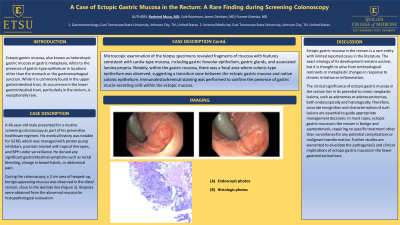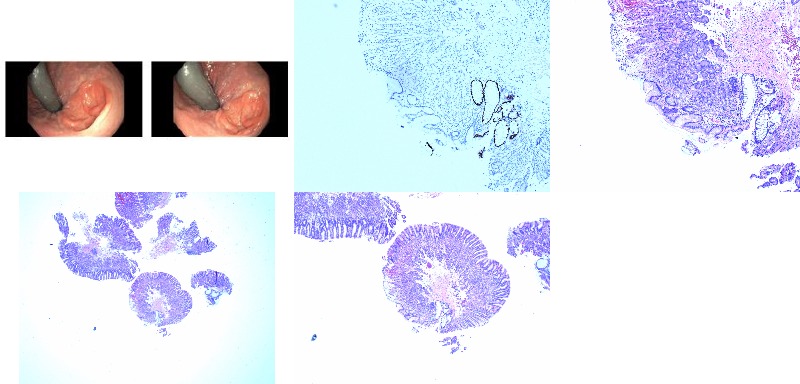Tuesday Poster Session
Category: Colon
P3681 - A Case of Ectopic Gastric Mucosa in the Rectum: A Rare Finding During Screening Colonoscopy
Tuesday, October 29, 2024
10:30 AM - 4:00 PM ET
Location: Exhibit Hall E

Has Audio

Rasheed Musa, MD
East Tennessee State University
Johnson City, TN
Presenting Author(s)
Rasheed Musa, MD, Parth Goenka, , Cole Bozeman, , James Denham, MD, Puneet Goenka, MD
East Tennessee State University, Johnson City, TN
Introduction: Ectopic gastric mucosa, also known as heterotopic gastric mucosa or gastric metaplasia, refers to the presence of gastric-type epithelium in locations other than the stomach or the gastroesophageal junction. While it is commonly found in the upper gastrointestinal tract, its occurrence in the lower gastrointestinal tract, particularly in the rectum, is exceptionally rare.
Case Description/Methods: A 48-year-old male presented for a routine screening colonoscopy as part of his preventive healthcare regimen. His medical history was notable for GERD, which was managed with proton pump inhibitors, psoriasis treated with topical therapies, and BPH under surveillance. He denied any significant gastrointestinal symptoms such as rectal bleeding, change in bowel habits, or abdominal pain.
During the colonoscopy, a 2 cm area of heaped-up, benign-appearing mucosa was observed in the distal rectum, close to the dentate line (Figure 1). Biopsies were obtained from the abnormal mucosa for histopathological evaluation.
Microscopic examination of the biopsy specimens revealed fragments of mucosa with features consistent with cardia-type mucosa, including gastric foveolar epithelium, gastric glands, and associated lamina propria. Notably, within the gastric mucosa, there was a focal area where colonic-type epithelium was observed, suggesting a transition zone between the ectopic gastric mucosa and native colonic epithelium. Immunohistochemical staining was performed to confirm the presence of gastric mucin-secreting cells within the ectopic mucosa.
Discussion: Ectopic gastric mucosa in the rectum is a rare entity with limited reported cases in the literature. The exact etiology of its development remains unclear, but it is thought to arise from embryological remnants or metaplastic changes in response to chronic irritation or inflammation.
The clinical significance of ectopic gastric mucosa in the rectum lies in its potential to mimic neoplastic lesions, such as adenomas or adenocarcinomas, both endoscopically and histologically. Therefore, accurate recognition and characterization of such lesions are essential to guide appropriate management decisions. In most cases, ectopic gastric mucosa in the rectum is benign and asymptomatic, requiring no specific treatment other than surveillance for any potential complications or malignant transformation. Further studies are warranted to elucidate the pathogenesis and clinical implications of ectopic gastric mucosa in the lower gastrointestinal tract.

Disclosures:
Rasheed Musa, MD, Parth Goenka, , Cole Bozeman, , James Denham, MD, Puneet Goenka, MD. P3681 - A Case of Ectopic Gastric Mucosa in the Rectum: A Rare Finding During Screening Colonoscopy, ACG 2024 Annual Scientific Meeting Abstracts. Philadelphia, PA: American College of Gastroenterology.
East Tennessee State University, Johnson City, TN
Introduction: Ectopic gastric mucosa, also known as heterotopic gastric mucosa or gastric metaplasia, refers to the presence of gastric-type epithelium in locations other than the stomach or the gastroesophageal junction. While it is commonly found in the upper gastrointestinal tract, its occurrence in the lower gastrointestinal tract, particularly in the rectum, is exceptionally rare.
Case Description/Methods: A 48-year-old male presented for a routine screening colonoscopy as part of his preventive healthcare regimen. His medical history was notable for GERD, which was managed with proton pump inhibitors, psoriasis treated with topical therapies, and BPH under surveillance. He denied any significant gastrointestinal symptoms such as rectal bleeding, change in bowel habits, or abdominal pain.
During the colonoscopy, a 2 cm area of heaped-up, benign-appearing mucosa was observed in the distal rectum, close to the dentate line (Figure 1). Biopsies were obtained from the abnormal mucosa for histopathological evaluation.
Microscopic examination of the biopsy specimens revealed fragments of mucosa with features consistent with cardia-type mucosa, including gastric foveolar epithelium, gastric glands, and associated lamina propria. Notably, within the gastric mucosa, there was a focal area where colonic-type epithelium was observed, suggesting a transition zone between the ectopic gastric mucosa and native colonic epithelium. Immunohistochemical staining was performed to confirm the presence of gastric mucin-secreting cells within the ectopic mucosa.
Discussion: Ectopic gastric mucosa in the rectum is a rare entity with limited reported cases in the literature. The exact etiology of its development remains unclear, but it is thought to arise from embryological remnants or metaplastic changes in response to chronic irritation or inflammation.
The clinical significance of ectopic gastric mucosa in the rectum lies in its potential to mimic neoplastic lesions, such as adenomas or adenocarcinomas, both endoscopically and histologically. Therefore, accurate recognition and characterization of such lesions are essential to guide appropriate management decisions. In most cases, ectopic gastric mucosa in the rectum is benign and asymptomatic, requiring no specific treatment other than surveillance for any potential complications or malignant transformation. Further studies are warranted to elucidate the pathogenesis and clinical implications of ectopic gastric mucosa in the lower gastrointestinal tract.

Figure: Ectopic gastric mucosa in rectum endo and histo
Disclosures:
Rasheed Musa indicated no relevant financial relationships.
Parth Goenka indicated no relevant financial relationships.
Cole Bozeman indicated no relevant financial relationships.
James Denham indicated no relevant financial relationships.
Puneet Goenka indicated no relevant financial relationships.
Rasheed Musa, MD, Parth Goenka, , Cole Bozeman, , James Denham, MD, Puneet Goenka, MD. P3681 - A Case of Ectopic Gastric Mucosa in the Rectum: A Rare Finding During Screening Colonoscopy, ACG 2024 Annual Scientific Meeting Abstracts. Philadelphia, PA: American College of Gastroenterology.
